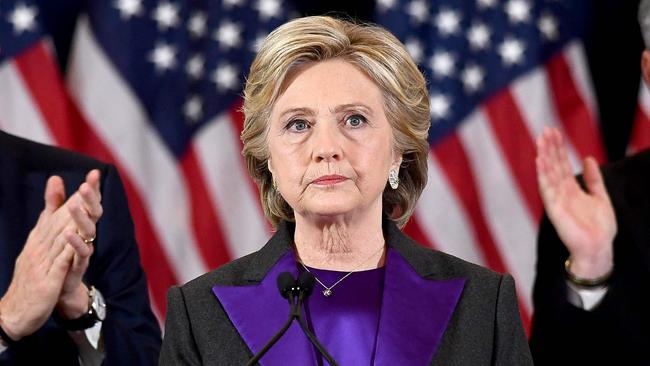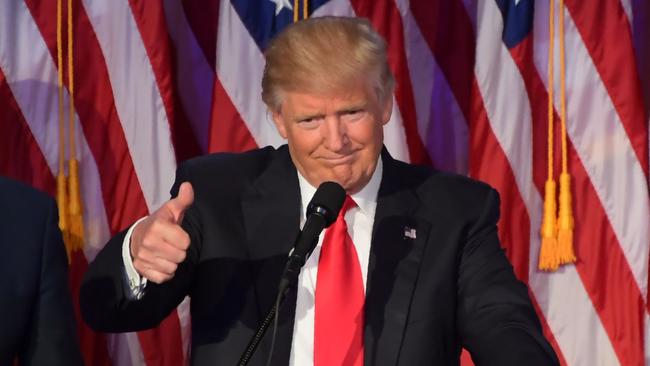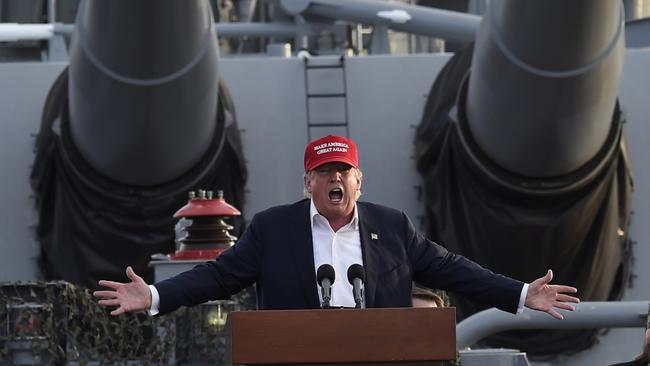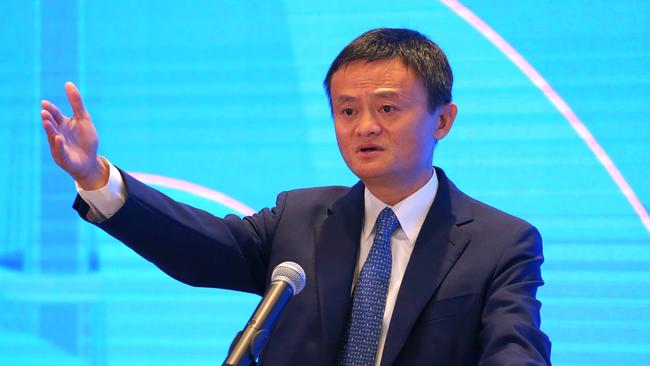How China feels about the US election result
LIKE much of the world, China was preparing for a Clinton presidency. So what’s next for the rising superpower — and Australia?
FROM panic in the global markets to outrage on social media, much of the world appears to be reeling over the results of the US election.
But if there’s one country likely to take advantage of Donald Trump’s victory, it’s China.
The rising superpower’s relationship with America is often tumultuous, and the election outcome feeds into the Chinese government’s narrative about the western media and political system.
So what exactly will this outcome mean for the US and China?
WHY A WIN FOR TRUMP IS A WIN FOR CHINA
Research shows Hillary Clinton was neither liked nor trusted by the Chinese.
She’s known for her tough stance against the country, publicly condemning its record on human rights, political system and system of censorship.
She’s also accused the country of hacking US computers and stealing commercial secrets and government information.
Most importantly, she’s expressed a desire for more US intervention in the disputed South China Sea.
Earlier this year, Chinese newspaper The Global Times conducted an online poll which found 54 per cent of Chinese citizens would vote for a Donald Trump presidency.

This doesn’t mean Beijing is celebrating Trump’s victory, but the Chinese government can use it to their advantage.
Throughout the 18-month election campaign, Trump has been a gift to China’s Communist party spin doctors.
They’ve successfully made an example out of his rise to power, using it as ammunition for their argument democracy is flawed.
Plus, the fact that pollsters and critics across the western media couldn’t predict his win lends evidence to China’s narrative that the western media is biased and corrupt.

Dr Adam Lockyer, a security expert at Macquarie University, told news.com.au Trump’s win sends a message — not just to China, but the rest of the world — that western democracy isn’t fool-proof.
“The United States sees itself as the beacon of democracy, liberalism and freedom,” he said. “Now they’re going to have a tough job going to places where democracy hasn’t taken route.
“This is an instance where it’s much more difficult to make the case than it was with Obama.”
After all, Donald Trump is the first president to rise to the role with absolutely no political or high-ranking military experience.
In China, leaders must be pushed through every level of the Communist Party system before they can secure the top job. Trump, with his outlandish statements, demonstrated lack of knowledge and sexist history, reinforces all of China’s negative views on western capitalism.
Now, the Chinese government can tell its people: what does a man who said such outrageous things, and was so widely derided in the global sphere, say about the democratic system?
WILL TRUMP HEIGHTEN SOUTH CHINA SEA TENSIONS?
Regardless of the president, the South China Sea remains one of the world’s most tense geopolitical regions.
The US has exercised its military power in the region throughout Obama’s presidency, contributing to rising tensions between the two global powers.
Dr Lockyer acknowledged Mr Trump’s position on foreign policy is vague at best, which makes it hard to predict what will happen next.
“It’s difficult to say what Trump’s position will be on the South China Sea,” he told news.com.au. “Most of his foreign policy is summarised in Twitter feeds. There’s not that much depth to them. We don’t even know who his foreign policy advisors are going to be.”
His best guess is that Trump will retreat from the region, which falls in line with his isolationist stance on America’s role in the world.
“Trump has a far more isolationist outlook than Clinton or Obama, but at the same time, if he had his own way, he’d be far more focused on domestic policy and domestic security, including things like terrorism and immigration.”
Therefore, it’s safe to assume Trump’s top priority in his first 100 days won’t be China.

But this doesn’t guarantee the US will take a backseat role in foreign affairs, saying unpredictable global events can radically alter a president’s regime.
“The last president with a purely domestic agenda was George W Bush. He was focused on scaling back America’s international involvement, but then 9/11 happened and he became one of the most foreign policy-intensive presidents.
“Trump may not have an interest in the outside world, but events take over. You can come into office and vow you’ll be a domestic president, but things happen. The office will shape him more than he shapes his office, because there’ll be all these constraints on his power.”
In terms of China, it’s unlikely we’ll need to brace for a radical shift at this stage.
“China will be careful not to provoke the United States or trigger any serious events,” said Dr Lockyer. “They’ll probably do similar to what they’re doing at the moment - building islands, and slowly but gradually asserting influence, without doing anything major. They’ll be careful not to provoke any response, because Trump is unpredictable — he can respond in a flash of anger.”
All in all, he said a Clinton presidency would have been more concerning for Beijing. “She knows Asia really, really well. Some of her advisors spent their whole careers there, they’re incredibly intelligent and they understand Asia better than anybody. They’d be paying attention to everything.
“For China, a Clinton presidency would have been predictable and stable, but they’d have known they weren’t going to get away with anything.
“Under Trump, it’s likely his administration won’t be paying as close attention to them, so they could theoretically get away with more.”

While nothing has been confirmed at this stage, he said Mr Trump will probably increase military spending.
“It’s likely that America will have a lot more military muscle under his presidency. While we can’t get ahead of ourselves, much of that will likely go into the Asia-Pacific region, because China’s a major challenger.”
He acknowledged the contradiction here: “On one hand they’re paying less diplomatic and critical attention to the region, but on the other they’re building more military presence in the region. At least in Clinton’s case, it was likely to be more diplomatic.”
If Mr Trump was to increase the United States’ military presence in the region, that could place further pressure on Australia to increase its involvement in the region.
Right now, we get away with doing enough to maintain our alliance to America, but not enough to compromise our crucial trade relationship with China. Ideally, we’d like to keep that balance for as long as we can.
WHAT ABOUT TRADE?
Dr Lockyer said Australia would most likely be affected if Mr Trump decided to implement his trade war against China.
Throughout his campaign, Mr Trump has vowed to impose a 45 per cent tariff on Chinese imports. In May, he infamously said “We can’t continue to allow China to rape our country, and that’s what they’re doing”.
Such an action could trigger a trade war if Beijing were to retaliate, which would directly impact Australia’s relationships with both countries.
But as Dr Lockyer pointed out, there’s no word on how or when he would go about implementing this.
Speaking to CNN, Chinese business magnate and CEO of Alibaba Jack Ma said he’s not worried about the relationship between the two countries.
“I don’t fear. I think a healthy and positive China-US relationship is so critical, especially in this country,” he said.
“(They’re the) number one and number two economy in the world. If they’re working together, they can solve a lot of problems: poverty, disease, the environment. But if they don’t work together, it will be disastrous.”

He said Trump’s threat to impose a 45 per cent tariff on Chinese imports was worrying, but “not that much”.
“(As the) chief executive of Alibaba, I know life is not easy. The world is not that simple. Donald Trump becomes the president of America - he’s a smart person, he will adjust. He should never and he would never neglect the relationship of China and America.”
He said his advice to the new President would be to focus on trade, improve globalisation and strengthen the relationship between China and the US.
“We’re in the 21st century,” he said. “Working together on trade and globalisation will help to create more jobs.
“We need to respect each other’s culture and we should forget about what we have been doing in the last century.”
A senior board member of China’s largest company has weighed in on the US election result, warning Mr Trump to tread carefully in steering economic relations with its biggest trade partner.
“The relationship between China and the US will define our century,” Alibaba Vice Chairman Joe Tsai told media in Shenzhen on Thursday, ahead of the company’s 11.11 Shopping Festival.
“We’ve just gone through a 17-month election cycle in the US where there has been a lot of rhetoric; but we think that when you are in the position of president, you have a responsibility to look out for your country.”
He said America could do this by embracing the reality of the global marketplace.
“If America disengages from the rest of the world, that will disappoint a lot of people,” Mr Tsai said.
He pointed out that China’s economy was growing six to seven per cent annually, compared with the 1.2 per cent in the US.
“China is creating three times the amount of wealth annually than the US,” he said.
“It means China is going to be the source of consumer demand and capital for America. So, if you’re the president, you have to pay a lot of attention to that, because your job is to create a lot of jobs in the US.”



